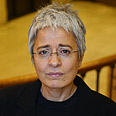
Palestinians, Israelis argue live in Arabic on BBC
Special broadcast on BBC Arabic service last week shows average Israelis, Palestinians summarizing Obama's first year in office. Program draws many responses. Despite criticism from Arab world, broadcast editors promise to continue
The BBC Arabic service enthusiastically summed up last Thursday's shows. A special broadcast on the channel's show Nuqtat Hewar (Talking Point) that summarized Obama's first year in office from three locations – Jerusalem, London, and Washington – created a rare dialogue between Israelis and Palestinians on live feed that was simultaneously broadcast on Arab television channels, the Internet, and other radio and television slots that carry the corporation's programming.
Not surprisingly, the discussion often took on heated tones.
The panel of interviewees this time around was not made up of politicians or leaders, but average citizens who explained to viewers and listeners their stances on the influence of the American president on Middle East affairs.
Last Thursday's broadcast on YouTube
From the Israeli side, Avi Melamed, a history teacher by profession, Yohanan Tzoref, an academic and expert on Palestinian affairs, and Yoni Yahav, a student, were invited to participate on the panel.
As they conversed in fluent Arabic, the three confronted their Palestinian counterparts who were invited to the broadcast on a series of issues on the political agenda. The Palestinian panel members were Ayesha a-Sayafi, a nurse by profession, Ayoub a-Tutanji, a student, and Dr. Jamal Amar, a building engineer.
Liliane Landor, head of Middle East region at the world service of the BBC, told Ynet that she is very proud of what was done on the programs and hopes in the future to take other topics considered taboo to address them directly and "bravely."
She noted that it is the first time Israelis and Palestinians and Israelis met on live feeds on television channels broadcast in Arabic. This is significant, she said, because the participants' facial expressions, which often showed visible signs of their frustration with the situation, could easily be detected.
Landor indicated that the success of the program stems from the opportunity given to the three participants on each side to discuss issues important to them. She said that one could clearly see the sincerity of the Israeli student, and the immense pain of the Palestinian nurse, for example.
A broad range of topics were addressed during the sometimes heated discussion. Both sides showered praises on the work of the American president to bring an end to the Middle East conflict.
Landor added that because of BBC editors' satisfaction with the program, the service would hold additional broadcasts based on the same model, if they have the financial resources to do so. Landor said she would like to hold a panel made up of only Israelis in order to hear their opinions on a number of topics, with similar panels being held for Palestinians and Arabs, noting that it is important to hear the opinions of the "regular" people.
Fruitful discussion or capitulation to normalization?
Many media outlets issued positive reviews of the broadcast. Lebanese newspaper as-Safir praised the British program, but noted that there were various groups in the Arab world that saw in it "a step towards normalization between Israelis and Palestinians."
The BBC was quick to respond to the statements and wrote to the newspaper: "Whoever believes that dialogue between Palestinians and Israelis amounts to normalization must know that such a thing has existed ever since Arab channels started interviewing Israeli officials and analysts."
According to one of the channel's editors, Bassam al-Andari, his staff tried "to bring the picture from both sides, and we saw in this an opportunity to hold a dialogue between us without a third party."
Editors of the British channel are already planning their next broadcast that will likely cause a stir in the Arab world. Landore said that in order to create something new, issues must be addressed with sincerity and bravery that have been thus far considered taboo. She said that the most important thing in innovating in the field is not to come with any sort of agenda.










